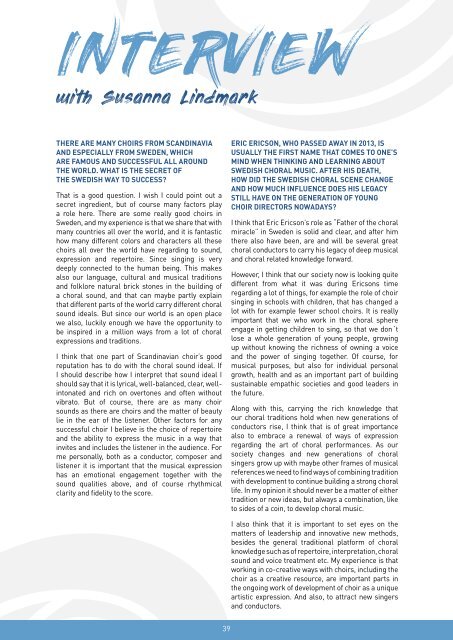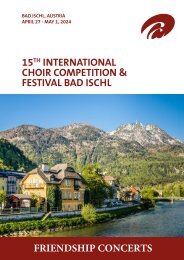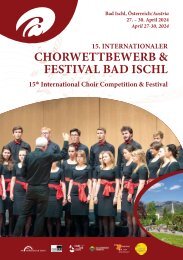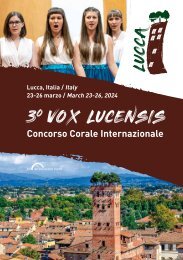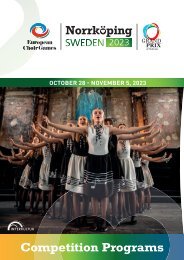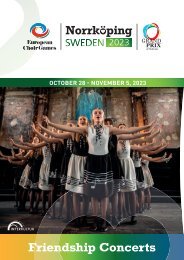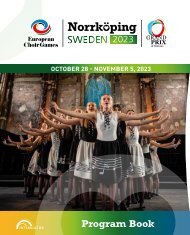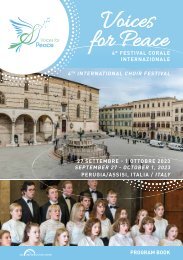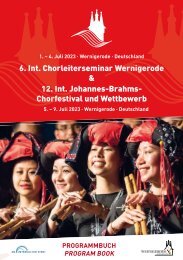COUNCIL TALK 02/2022 - The digital magazine of the World Choir Council
The digital magazine COUNCIL TALK is the magazine of the INTERKULTUR World Choir Council – in exchange with the choir world. It is published twice a year at the end of January and August. In addition to reviews of the projects and meetings of the World Choir Council, the magazine focuses primarily on current issues and challenges of the choral scene.
The digital magazine COUNCIL TALK is the magazine of the INTERKULTUR World Choir Council – in exchange with the choir world. It is published twice a year at the end of January and August.
In addition to reviews of the projects and meetings of the World Choir Council, the magazine focuses primarily on current issues and challenges of the choral scene.
- No tags were found...
You also want an ePaper? Increase the reach of your titles
YUMPU automatically turns print PDFs into web optimized ePapers that Google loves.
INTERVIEW<br />
with Susanna Lindmark<br />
THERE ARE MANY CHOIRS FROM SCANDINAVIA<br />
AND ESPECIALLY FROM SWEDEN, WHICH<br />
ARE FAMOUS AND SUCCESSFUL ALL AROUND<br />
THE WORLD. WHAT IS THE SECRET OF<br />
THE SWEDISH WAY TO SUCCESS?<br />
That is a good question. I wish I could point out a<br />
secret ingredient, but <strong>of</strong> course many factors play<br />
a role here. <strong>The</strong>re are some really good choirs in<br />
Sweden, and my experience is that we share that with<br />
many countries all over <strong>the</strong> world, and it is fantastic<br />
how many different colors and characters all <strong>the</strong>se<br />
choirs all over <strong>the</strong> world have regarding to sound,<br />
expression and repertoire. Since singing is very<br />
deeply connected to <strong>the</strong> human being. This makes<br />
also our language, cultural and musical traditions<br />
and folklore natural brick stones in <strong>the</strong> building <strong>of</strong><br />
a choral sound, and that can maybe partly explain<br />
that different parts <strong>of</strong> <strong>the</strong> world carry different choral<br />
sound ideals. But since our world is an open place<br />
we also, luckily enough we have <strong>the</strong> opportunity to<br />
be inspired in a million ways from a lot <strong>of</strong> choral<br />
expressions and traditions.<br />
I think that one part <strong>of</strong> Scandinavian choir’s good<br />
reputation has to do with <strong>the</strong> choral sound ideal. If<br />
I should describe how I interpret that sound ideal I<br />
should say that it is lyrical, well-balanced, clear, wellintonated<br />
and rich on overtones and <strong>of</strong>ten without<br />
vibrato. But <strong>of</strong> course, <strong>the</strong>re are as many choir<br />
sounds as <strong>the</strong>re are choirs and <strong>the</strong> matter <strong>of</strong> beauty<br />
lie in <strong>the</strong> ear <strong>of</strong> <strong>the</strong> listener. O<strong>the</strong>r factors for any<br />
successful choir I believe is <strong>the</strong> choice <strong>of</strong> repertoire<br />
and <strong>the</strong> ability to express <strong>the</strong> music in a way that<br />
invites and includes <strong>the</strong> listener in <strong>the</strong> audience. For<br />
me personally, both as a conductor, composer and<br />
listener it is important that <strong>the</strong> musical expression<br />
has an emotional engagement toge<strong>the</strong>r with <strong>the</strong><br />
sound qualities above, and <strong>of</strong> course rhythmical<br />
clarity and fidelity to <strong>the</strong> score.<br />
ERIC ERICSON, WHO PASSED AWAY IN 2013, IS<br />
USUALLY THE FIRST NAME THAT COMES TO ONE’S<br />
MIND WHEN THINKING AND LEARNING ABOUT<br />
SWEDISH CHORAL MUSIC. AFTER HIS DEATH,<br />
HOW DID THE SWEDISH CHORAL SCENE CHANGE<br />
AND HOW MUCH INFLUENCE DOES HIS LEGACY<br />
STILL HAVE ON THE GENERATION OF YOUNG<br />
CHOIR DIRECTORS NOWADAYS?<br />
I think that Eric Ericson’s role as “Fa<strong>the</strong>r <strong>of</strong> <strong>the</strong> choral<br />
miracle” in Sweden is solid and clear, and after him<br />
<strong>the</strong>re also have been, are and will be several great<br />
choral conductors to carry his legacy <strong>of</strong> deep musical<br />
and choral related knowledge forward.<br />
However, I think that our society now is looking quite<br />
different from what it was during Ericsons time<br />
regarding a lot <strong>of</strong> things, for example <strong>the</strong> role <strong>of</strong> choir<br />
singing in schools with children, that has changed a<br />
lot with for example fewer school choirs. It is really<br />
important that we who work in <strong>the</strong> choral sphere<br />
engage in getting children to sing, so that we don´t<br />
lose a whole generation <strong>of</strong> young people, growing<br />
up without knowing <strong>the</strong> richness <strong>of</strong> owning a voice<br />
and <strong>the</strong> power <strong>of</strong> singing toge<strong>the</strong>r. Of course, for<br />
musical purposes, but also for individual personal<br />
growth, health and as an important part <strong>of</strong> building<br />
sustainable empathic societies and good leaders in<br />
<strong>the</strong> future.<br />
Along with this, carrying <strong>the</strong> rich knowledge that<br />
our choral traditions hold when new generations <strong>of</strong><br />
conductors rise, I think that is <strong>of</strong> great importance<br />
also to embrace a renewal <strong>of</strong> ways <strong>of</strong> expression<br />
regarding <strong>the</strong> art <strong>of</strong> choral performances. As our<br />
society changes and new generations <strong>of</strong> choral<br />
singers grow up with maybe o<strong>the</strong>r frames <strong>of</strong> musical<br />
references we need to find ways <strong>of</strong> combining tradition<br />
with development to continue building a strong choral<br />
life. In my opinion it should never be a matter <strong>of</strong> ei<strong>the</strong>r<br />
tradition or new ideas, but always a combination, like<br />
to sides <strong>of</strong> a coin, to develop choral music.<br />
I also think that it is important to set eyes on <strong>the</strong><br />
matters <strong>of</strong> leadership and innovative new methods,<br />
besides <strong>the</strong> general traditional platform <strong>of</strong> choral<br />
knowledge such as <strong>of</strong> repertoire, interpretation, choral<br />
sound and voice treatment etc. My experience is that<br />
working in co-creative ways with choirs, including <strong>the</strong><br />
choir as a creative resource, are important parts in<br />
<strong>the</strong> ongoing work <strong>of</strong> development <strong>of</strong> choir as a unique<br />
artistic expression. And also, to attract new singers<br />
and conductors.<br />
39


